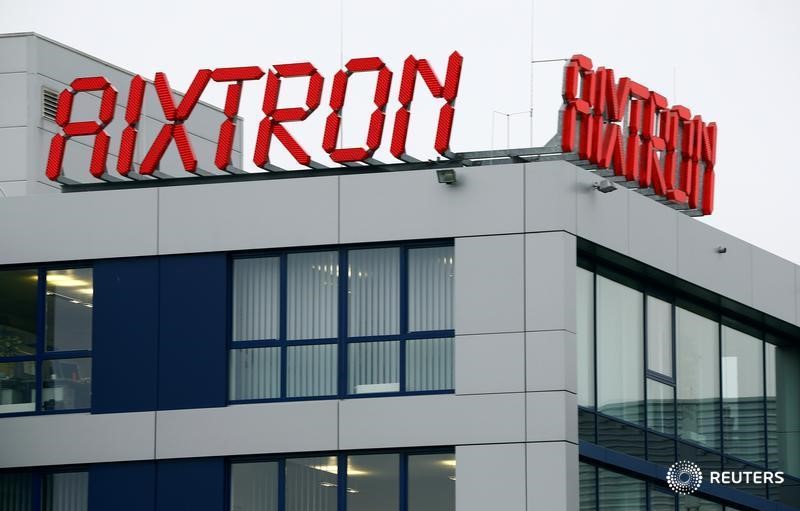By Harro Ten Wolde and Sabine Siebold
FRANKFURT/BERLIN (Reuters) - Concerns over China gaining access to the secrets of producing a little known material used in military equipment appear to be behind the U.S. block on a 670 million-euro ($713 million) Chinese bid for German chip equipment maker Aixtron (DE:AIXGn).
Gallium nitride, a powdery yellow compound used in light-emitting diodes (LED), radar, antennas and lasers, is grown using Aixtron-manufactured technology, which has in the past been sold to U.S. military equipment maker Northrop Grumman (NYSE:NOC)
Aixtron said on Friday that the Committee on Foreign Investment in the United States (CFIUS) would recommend that its takeover by China's Fujian Grand Chip Investment Fund (FGC) be blocked.
CFIUS never gives reasons for its decisions. But sources have previously told Reuters it blocked the $3.3 billion sale of Philips' (AS:PHG) lighting business, Lumileds, to a consortium of Chinese investors last January over gallium nitride concerns.
Experts suggest the United States would want to stop China and Russia getting hold of gallium nitride technology, which can boost the power and sensitivity of weapons systems while reducing their cost as it requires less electricity.
The technology is being used to upgrade the radars of both U.S. and foreign-owned Patriot missile defense systems – which are key to defeating air and missile attacks by enemy countries.
Colin Humphreys, a physics professor at Cambridge University, said the technology enabled military radars to operate at much higher frequencies and are used in jammers that allow fighter jets and other aircraft to fly undetected.
In order to sense such radar waves, potential enemies such as Russia or China would have to have access to military technology using gallium nitride, he said.
"I'm not aware that the Chinese or the Russians have such weapons systems at the moment," said Humphreys, an expert on gallium nitride.
Another European expert, who did not wish to be named, said he believed fewer than 10 countries had access to the technology, including the United States, Germany, France, Britain and Japan.
The global gallium nitride market is expected to grow to $1.1 billion in 2020 from an estimated $518 million last year, according to research firm Technavio.
The U.S. resistance to the Aixtron deal shows concern is rife in Washington about a leading manufacturer of the gallium nitride technology coming under Chinese ownership.
"The Americans' big problem is not Moscow, but Beijing – in economic terms and maybe also in military terms," the European expert said, adding he would expect U.S. President-elect Donald Trump to significantly raise export restrictions for the technology.
A German economy ministry spokeswoman said its review of the Aixtron deal was ongoing and independent of the United States.
The German government withdrew its approval for Fujian Grand Chip Investment Fund LP (FGC), a Chinese investment fund controlled by businessman Zhendong Liu, to take over Aixtron last month, citing security concerns.
OUT OF OPTIONS?
Aixtron on Monday defied calls to scrap the sale, saying it had "objective arguments" to overcome U.S. and German concerns about it being bought by Fujian, without elaborating.
"We are in close contact with the authorities in the USA and Germany," a spokesman said. He added it was up to customers to decide to what use they would put Aixtron equipment.
Aixtron's decision to stick to the plan marks the first time that companies involved in such a takeover have tried to press ahead with a planned merger despite CFIUS objections. After concerns were raised over the Lumileds sale, the parties walked away from that deal.
Aixtron is seen as having a bleak future as a standalone company as it struggles with overcapacity in a market dominated by Chinese buyers.
The decision will now be referred to U.S. President Barack Obama, who must block or allow the transaction within 15 days.
Shares in Aixtron were down 7 percent to 4.38 euros by 1414 GMT, at the bottom of the German technology index (TECDAX), which was down 0.3 percent, and well below Grand Chip Investment's offer price of 6.00 euros per share.
Earlier, the stock hit a 6-month low of 4.25 euros.
"What Aixtron needs is a white knight from Europe or the U.S. (e.g. Applied Materials (NASDAQ:AMAT)) as the company has no viable future as a stand-alone business, in our view," said analyst Tim Wunderlich at German brokerage Hauck & Aufhaeuser in a client note, sticking to its "sell" recommendation.
($1 = 0.9401 euros)
